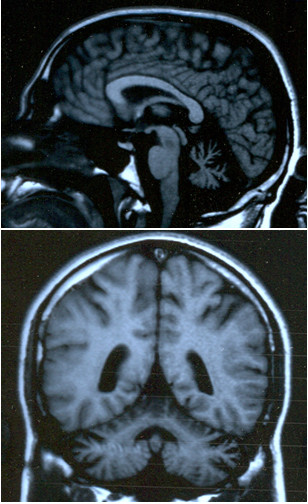You may not know you have gluten intolerance - but you should be highly suspect if you have elevated liver enzymes.
From the Desk of Dr. Karl R.O.S. Johnson, DC.....
Gluten Intolerance, Elevated Liver Enzymes and Liver Damage
Posted by Dr. Karl R.O.S. Johnson, DC on Sun, Nov 20, 2011
Topics: Cyrex Labs, gluten, gluten intolerance, celiac, liver, elevated liver enzymes
How Gluten Intolerance Can Cause Unstable Gait
Posted by Dr. Karl R.O.S. Johnson, DC on Tue, Oct 18, 2011
The body of research surrounding gluten sensitivity grows every year alerting the medical community and people suffering from a wide range of symptoms to possible connections between seemingly untreatable medical conditions and gluten intolerance. Of note recently is the growing recognition of gluten sensitivity and gluten ataxia, a neurological condition affecting balance and coordination.
Beyond Indigestion
For decades, the medical profession has limited diagnosis of gluten intolerance to those patients who tested positive for celiac disease via an antigliadin antibodies test or endoscopy. Those patients who tested negative on these tests were told they didn't have celiac disease (CD) and that gluten was not their problem. The traditional medical mindset is celiac disease manifests primarily in gastrointestinal distress. Modern research shows that for every symptomatic patient with CD there are eight patients with CD with no GI symptom
Now we know, however, that gluten intolerance covers an entire range of symptoms including celiac disease, dermatitis herpetiformis (skin conditions associated with gluten sensitivity such as psoriasis or eczema), thyroid irregularities and other inflammatory and neurological conditions. In fact, a good number of people with gluten sensitivities don't have any gastrointestinal symptoms at all leading some doctors to disregard gluten as a root cause of symptoms.
In all cases, however, the body attacks gluten and resulting in a wide range of symptoms. Gluten ataxia is one of those symptoms caused by gluten sensitivity that may or may not be seen in conjunction with gastrointestinal distress.
Diagnosing Ataxia
By definition, ataxia is a condition affecting your muscle coordination during voluntary movements like walking or using your hands. Ataxia can also affect speech, your eyes and your swallowing reflex. Those who suffer from ataxia may find it difficult to grasp objects, walk up and down stairs, balance or successfully navigate doorways without running into them. On the extreme end, ataxia can drive patients to wheelchairs, prevent people from working or even interfere with the body's swallowing reflex.
Diagnosing gluten ataxia has been slow. Most often, doctors look for other underlying symptoms of ataxia including head trauma, stroke or multiple sclerosis. Additionally, few in the medical community have embraced the notion that a person without gastrointestinal symptoms could have a gluten sensitivity manifesting in other ways.
The work of Dr. Marios Hadjivassiliou in researching gluten ataxia has played a key role in encouraging patients to ask their doctors about this manifestation of gluten intolerance. Dr. Hadjivassiliou has documented correlations between ataxia and a heightened immune response to gluten. His work also pushes doctors to look beyond the gut when diagnosing gluten sensitivities.
Patients with unexplained coordination and balance problems should ask their doctor about the possibility of gluten ataxia whether they suffer from other known manifestations of gluten sensitivity or not.
Seeking a Cure
Eating a strict gluten free lifestyle can alleviate many of the symptoms of ataxia, just as the lifestyle can help those who suffer from celiac disease and skin conditions caused by gluten. It is also important for those who suffer from gluten ataxia to work with someone in the medical field who understands their diagnosis and will work with them on the root cause of the ataxia. The brain heals much more slowly than the intestinal tract and those with ataxia may take longer to heal and see a true remission of symptoms than those with primarily skin or bowel symptoms. A doctor specializing in gluten sensitivities and who takes a holistic approach to medicine is best suited to working with sufferers of ataxia.
Hope and help is out there for the growing number of people discovering the extent of gluten sensitivity including balance and coordination challenges stemming from gluten ataxia. The key is going to a doctor who knows how to properly test you so the root cause of your health challenge can be found.
Topics: autoimmune, Cyrex Labs, gluten sensitivity, Dr. Karl R.O.S. Johnson DC, Ataxia, Dr. Aristo Vojdani
Why Do I Have to Exclude Gluten for Life? - I'm Feeling Fine
Posted by Dr. Karl R.O.S. Johnson, DC on Wed, Sep 07, 2011
We are all creatures of habit, but when it comes to our food selections we can make "CRAZY" decisions. Gluten can be very difficult to give up because of a little talked about compound it contains. Often this compound can lead to addiction to wheat. Similar compounds can lead to addiction to dairy and soy as well. If the proper testing is not done - dire health consequences can be yours due to irrational decisions.
Topics: Dr Karl Johnson, Cyrex Labs, gluten sensitivity, gluten, gluten epitope, Aristo Vojdani, IBS, Colitis
Why A Gluten Free Diet May Not Be Enough to Stop Inflammation
Posted by Dr. Karl R.O.S. Johnson, DC on Tue, Aug 16, 2011
Adopting a gluten free diet has helped many people begin a healing process that will take years. Thanks in part to a recent surge in gluten sensitivity diagnoses and improved gluten free products, more and more people are starting down the path that will help them find relief for the chronic pain, inflammation, fatigue and intestinal distress they have suffered with for many years. However, a gluten free diet alone may not be enough to stop inflammation from occurring. People who have started a gluten free diet but who still experience inflammation and other symptoms should consider additional testing and dietary and lifestyle changes to address ongoing, chronic symptoms.
Why Do I Still Feel Bad?
Adopting a gluten free diet makes most people with a gluten sensitivity or other inflammatory diseases like Fibromyalgia and thyroid disorders feel better within a short time frame. Severe symptoms may begin to abate, energy will start to return and skin disorders like psoriasis may begin to clear. But living gluten free is usually not enough to completely avoid the inflammatory symptoms caused by gluten and its relatives.
This happens for several reasons. First, cross contamination of gluten free food is common and gluten can hide in a variety of foods people might not consider as having gluten such as sauces, sour cream and snack foods. Additionally, many foods that are similar to gluten react with the gluten antibody. An immune system already on the defense against gluten will treat these other foods the same way it treats the gluten peptide thus starting the cycle of inflammation all over again. Finally, there could be additional unidentified health concerns contributing to a body's inflammatory response.
Additional Testing
Medical tests are not one size fits all and often, people receive misinformation from the medical community because physicians simply ordered the wrong test. Proper testing has to go in depth and cover a wide range and breadth of issues to truly present a whole picture of a patient. Until recently, there was only one test used by the medical community to determine if people had a gluten sensitivity or not and this test was often wrong.
Thankfully, Cyrex Labs in Arizona developted several tests that are more sensitive and more accurate and that allow physicians to look further into a patient's gluten sensitivity. These tests include:
Topics: Dr Karl Johnson, autoimmune, Cyrex Labs, gluten, gluten free, inflammation
Why Is Gluten Sensitivity So Prevalent And How It Wrecks Your Health
Posted by Dr. Karl R.O.S. Johnson, DC on Sun, Mar 06, 2011
Topics: Dr Karl Johnson, autoimmune, Cyrex Labs, gluten sensitivity, gluten, thyroid
New Testing Reveals Factors Causing Autoimmune Thyroid and More
Posted by Dr. Karl R.O.S. Johnson, DC on Tue, Feb 08, 2011
|
Topics: autoimmune, Cyrex Labs, gluten sensitivity, gluten, thyroid, celiac, casein









